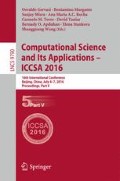Abstract
As population increases and technological developments advances, criminal activities become complex and sophisticated. Understanding relationships between criminal activities, social factors, geographical locations, crime types, communications links, etc. becomes very crucial. Physical surveillance and other conventional modes of analysis of crime data does not show relationships between direct criminal activity variables and create visualization and interactivity between them. This has yielded difficulties in controlling indirect and direct factors that are likely to provide an environment for such activities. Within this paper, we proposed and engaged Formal Concept Analysis which is based on Galois lattice theory to create relationships between criminal activities, social factors, geographical locations, crime types, communications links, etc. This created a better visualization of relationships between geographical areas and provided a better view in combating crime as well as providing intelligence on the environmental factors based on geography.
Access this chapter
Tax calculation will be finalised at checkout
Purchases are for personal use only
References
Stefanowski, J., Japkowicz, N.: Final remarks on big data analysis and its impact on society and science. In: Stefanowski, J., Japkowicz, N. (eds.) Big Data Analysis: New Algorithms for a New Society. Studies in Big Data, vol. 16, pp. 305–329. Springer International Publishing, Switzerland (2005)
Gillingham, P., Graham, T.: Big data in social welfare: the development of a critical perspective on social work’s latest “electronic turn”. Austr. Soc. Work 1–13 (2016)
Ratcliffe, J.H.: Intelligence-Led Policing. Willan Publishing, Cullompton, Devon (2008)
Ganter, B., Wille, R.: Formal Concept Analysis: Mathematical Foundations. Springer Science & Business Media, New York (2012)
Ganter, B., Stumme, G., Wille, R.: Formal Concept Analysis: Foundations and Applications, vol. 3626. Springer, Heidelberg (2005)
Tilley, T., Cole, B., Becker, P., Eklund, P.: A survey of formal concept analysis support for software engineering activities. In: Ganter, B., Stumme, G., Wille, R. (eds.) Formal Concept Analysis. LNCS (LNAI), vol. 3626, pp. 250–271. Springer, Heidelberg (2005)
Tonella, P., Ceccato, M.: Aspect mining through the formal concept analysis of execution traces. In: 2004 IEEE Proceedings of 11th Working Conference on Reverse Engineering, pp. 112–121. IEEE (2004). doi:10.1109/WCRE.2004.13
Snelting, G., Tip, F.: Understanding class hierarchies using concept analysis. ACM Trans. Program. Lang. Syst. 22, 540–582 (2000)
Cimiano, P., Hotho, A., Stumme, G., Tane, J.: Conceptual knowledge processing with formal concept analysis and ontologies. In: Eklund, P. (ed.) ICFCA 2004. LNCS (LNAI), vol. 2961, pp. 189–207. Springer, Heidelberg (2004)
Godin, R., Valtchev, P.: Formal concept analysis-based class hierarchy design in object-oriented software development. In: Ganter, B., Stumme, G., Wille, R. (eds.) Formal Concept Analysis. LNCS (LNAI), vol. 3626, pp. 304–323. Springer, Heidelberg (2005)
Hesse, W., Tilley, T.: Formal concept analysis used for software analysis and modelling. In: Ganter, B., Stumme, G., Wille, R. (eds.) Formal Concept Analysis. LNCS (LNAI), vol. 3626, pp. 288–303. Springer, Heidelberg (2005)
Cellier, P., Ducassé, M., Ferré, S., Ridoux, O.: Formal concept analysis enhances fault localization in software. In: Medina, R., Obiedkov, S. (eds.) ICFCA 2008. LNCS (LNAI), vol. 4933, pp. 273–288. Springer, Heidelberg (2008)
Priss, U.: Formal concept analysis in information science. Arist 40(1), 521–543 (2006)
Tilley, T.: Tool support for FCA. In: Eklund, P. (ed.) ICFCA 2004. LNCS (LNAI), vol. 2961, pp. 104–111. Springer, Heidelberg (2004)
Tourwe, T., Mens, K.: Mining aspectual views using formal concept analysis. In: 2004 Fourth IEEE International Workshop on Source Code Analysis and Manipulation, pp. 97–106 (2004). doi:10.1109/SCAM.2004.15
du Boucher-Ryan, P., Bridge, D.: Collaborative recommending using formal concept analysis. Knowledge-Based Systems, Elsevier 19(5), 309–315 (2006)
Beydoun, G.: Formal concept analysis for an e-learning semantic web. Expert Syst. Appl. 36(8), 10952–10961 (2009)
Voss, S., Joslyn, C.: Advanced knowledge integration in assessing terrorist threats. LANL Technical report, LAUR 02-7867 (2002)
Andrews, S., Akhgar, B., Yates, S., Stedmon, A., Hirsch, L.: Using formal concept analysis to detect and monitor organised crime. In: Larsen, H.L., Martin-Bautista, M.J., Vila, M.A., Andreasen, T., Christiansen, H. (eds.) FQAS 2013. LNCS, vol. 8132, pp. 124–133. Springer, Heidelberg (2013)
Ganter, B., Wille, R.: Formal Concept Analysis: Mathematical Foundations. Springer, Heidelberg (1998)
Priss, U.: Formal concept analysis in information science. Ann. Rev. Inf. Sci. (ASIST) 40, 521–543 (2008)
Andrews, S.: In-Close2, a High Performance Formal Concept Miner. In: Andrews, S., Polovina, S., Hill, R., Akhgar, B. (eds.) ICCS-ConceptStruct 2011. LNCS, vol. 6828, pp. 50–62. Springer, Heidelberg (2011)
Andrews, S., Orphanides, C.: FcaBedrock, a formal context creator. In: Croitoru, M., Ferré, S., Lukose, D. (eds.) ICCS 2010. LNCS, vol. 6208, pp. 181–184. Springer, Heidelberg (2010)
Becker, P., Correia, J.H.: The ToscanaJ suite for implementing conceptual information systems. In: Ganter, B., Stumme, G., Wille, R. (eds.) Formal Concept Analysis. LNCS (LNAI), vol. 3626, pp. 324–348. Springer, Heidelberg (2005)
Yevtushenko, S.A.: System of data analysis “concept explorer”. In: Proceedings of the 7th National Conference on Artificial Intelligence KII-2000, pp. 127–134 (2000). (in Russian)
United Nations: Global programme against transnational organized crime. Results of a pilot survey of forty selected organized criminal groups in sixteen countries. Technical report, Office on Drugs and Crime, United Nations (2002)
Outrata, J.: Drawing lattices with a geometric heuristic. In: 2008 4th International IEEE Conference on Intelligent Systems, IS 2008, vol. 2, pp. 15–35. IEEE, September, 2008
Author information
Authors and Affiliations
Corresponding author
Editor information
Editors and Affiliations
Rights and permissions
Copyright information
© 2016 Springer International Publishing Switzerland
About this paper
Cite this paper
Kester, QA. (2016). Using Formal Concepts Analysis Techniques in Mining Data from Criminal Databases and Profiling Events Based on Factors to Understand Criminal Environments. In: Gervasi, O., et al. Computational Science and Its Applications – ICCSA 2016. ICCSA 2016. Lecture Notes in Computer Science(), vol 9790. Springer, Cham. https://doi.org/10.1007/978-3-319-42092-9_37
Download citation
DOI: https://doi.org/10.1007/978-3-319-42092-9_37
Published:
Publisher Name: Springer, Cham
Print ISBN: 978-3-319-42091-2
Online ISBN: 978-3-319-42092-9
eBook Packages: Computer ScienceComputer Science (R0)

